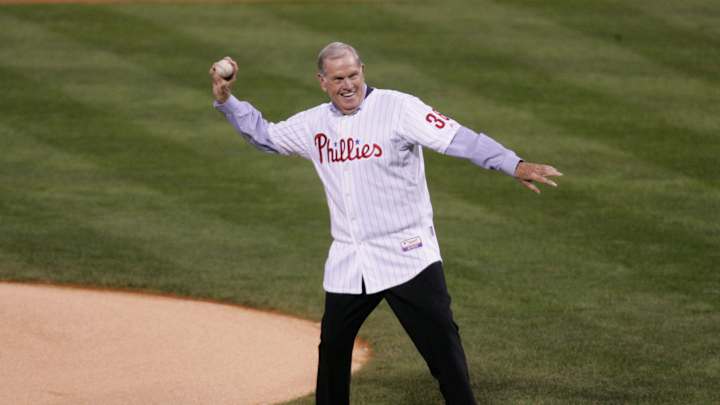Phillies Legends: Robin Roberts

In September of 1950, Robin Roberts and the Phillies held a commanding 7 ½ game lead for the National League pennant. A tough two-week losing streak brought them to the final game of the season as their lead shrank to just one game. They were set to face the second-place Brooklyn Dodgers who had been scorching hot in September.
A Philadelphia win would mean the pennant race was over and the Phillies were heading to the World Series, but a Brooklyn win would force a three-game series to determine the National League champion.
Phillies manager, Eddie Sawyer, selected Robin Roberts to pitch for the Phillies in a must-win game. Don Newcombe took the mound for the Dodgers, making it a clash of baseball’s best pitchers.
The two pitchers dominated for the first five innings, but the Phillies strung a few hits together in the sixth to take a 1-0 lead. In the bottom of the inning, Pee Wee Reese hit a fly ball down the left field line that barely made it over the fence to tie the game.
Roberts cruised through the seventh and eighth innings, but in the bottom of the ninth, he found trouble. A walk and a base-hit put runners on first and second with no outs. Another hit into center field nearly scored the winning run, but Richie Ashburn got the ball in quickly to get the runner out at home.
Having runners at second and third with one out, Roberts intentionally walked Jackie Robinson to set up a force at every base. Roberts then got the second and third outs of the inning on a pop out to first base and a fly out to right field. This game was going to extras.
In the top of the tenth, Dick Sisler hit a go-ahead three run homer to give the Phillies a 4-1 lead and put them just three outs away from going to the World Series.
Eddie Sawyer kept Roberts in for the tenth, and he shut down the Dodgers with a 1-2-3 inning. This would be the Phillies’ first pennant since 1915, when Grover Cleveland Alexander was the Phillies ace.
Alexander was a major inspiration to Roberts when he was a kid, and their careers saw many parallels. In that same 1950 season, Roberts became the first Phillies pitcher to win 20 games since Alexander’s 30 wins in 1917. In 1958, Roberts broke Alexander’s franchise wins record with his 191st victory. And in 1976, Roberts was the first Phillies player elected into the National Baseball Hall of Fame by the Baseball Writers Association of America (BBWAA) since Alexander.
Roberts was truly one of the greatest pitchers in Phillies history, but to get a better understanding, let’s look at his career achievements:
- Inducted into the Hall of Fame (1976)
- 7x All-Star
- Started five All-Star games - Ties MLB record
- Led the league in complete games five times
- 305 career complete games - 38th all-time
- 316 putouts as a pitcher - 17th all-time
- Finished top 10 in MVP voting five times
- 83.0 WAR for pitchers - 22nd all-time
1952 was the best of Roberts’ 19 Major League seasons. His 28-7 record was the best in baseball, and his 2.59 ERA and 1.021 WHIP were the best of his career. He was voted Major League Player of the Year and National League Pitcher of the Year by The Sporting News, and everyone thought he was a shoe-in for league MVP. Roberts wound up finishing in second place for MVP in ‘52 behind Chicago Cubs left fielder, Hank Sauer.
MLB Commissioner, Ford Frick, believed that Roberts not receiving the award for his dominant season was a travesty. He realized that pitchers did not get the recognition they deserve, so a few years later in 1956, Frick announced the creation of the Cy Young Award, an award given out to the best pitcher in the majors (later changed to award the best pitcher in each league).
Roberts pitched with the Phillies from 1948 to 1961 and put together one of the most solid careers on the mound Philadelphia has ever seen. With the Phillies, Roberts won 234 games, put up a 3.46 ERA, struck out 1,871 batters, and recorded a 1.171 WHIP.
The last couple years with the Phillies were down years for Roberts, and he left the team after the ‘61 season. A solid four years in Baltimore and short stints in both Houston and Chicago would put an end to his career as he retired after the 1966 season.
Exactly 10 years later, in his first year of eligibility, Roberts was inducted into the National Baseball Hall of Fame by the BBWAA. His slow wind-up and quick delivery, mixed with a pinpoint accurate fastball that had the illusion of a riser will forever be feared by those who batted against him. He was so well respected and adored by the Phillies, that no one will ever wear Roberts’ number 36 again. His number was retired in 2008 and will be celebrated in Phillies lore forever.
More From SI's Inside The Phillies:
- Phillies Season in Review: Ronald Torreyes
- Phillies Trade Scenarios: Who Might Dombrowski Move This Offseason?
- Could Acquiring Starling Marte Make Sense for Phillies?
Make sure to follow Inside the Phillies on Facebook and Twitter!
